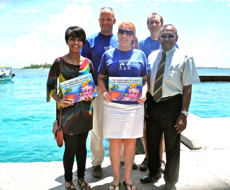Maldivian media outlets this morning published as fact a satirical Telegraph news blog citing “unconfirmed rumours” that the 14th edition of the Times Comprehensive Atlas of the World will omit the Maldives, Tuvalu, “and major parts of Bangladesh” as a statement on global warming.
The blog post, written by climate change skeptic James Delingpole who describes himself as “a writer, journalist and broadcaster who is right about everything”, features comments by a “Times Atlas spokesman” David Rose.
In a UK press scandal this year, ‘David Rose’ was found to be a psuedonym used by left-wing Independent journalist and climate change writer Johaan Hari to edit his own wikipedia entry, advocate his own position and attack his critics.
Rose, who in Delingpole’s article holds “a doctorate in Cambridge in Climate Change and Sinking Islands Studies so I know what I’m talking about, and if you don’t believe me, ask my friend Johaan Hari who taught me everything I know”, acknowledges that it “may not be strictly geographically accurate to say the Maldives and Tuvalu will definitely have disappeared in about ten years time when our next edition appears.”
“But did you see that picture of the Maldives cabinet holding a meeting underwater? If the Maldives government says the Maldives are drowning, they must be drowning. And frankly I think it’s despicable, all those deniers who are saying it was just a publicity stunt, cooked up by green activist Mark Lynas, to blackmail the international community into giving the Maldives more aid money while simultaneously trying to lure green Trustafarians to come and spend £1500 a night in houses on stilts with gold-plated organic recyclable eco-toilets made of rare earth minerals from China. Why would a government lie about something as serious as climate change?”
Rose goes on to state that “I’m pleased to say that this is a view of the world shared by my colleagues at Times Comprehensive Atlas Of The World. They understand that maps based on accurately recorded geographical features belong in the Victorian age of child chimney sweeps. What we need now is maps that change the world, transforming into something which it isn’t actually yet but might be one day if we don’t act NOW!”
A spokesperson for HarperCollins, publisher of the Times Atlas, told Minivan News that “the piece in today’s Daily Telegraph is a satirical story. Of course we have no plans to erase the Maldives, Tuvalu or major parts of Bangladesh from the next edition of The Times Comprehensive Atlas of the World. There is no one at HarperCollins called David Rose. Like the rest of the piece, he is a fiction.”
Meanwhile, Ahmed Mahlouf, MP for former President Maumoon Abdul Gayoom’s new political party the Progressive Party of the Maldives (PPM), today sent out a mass text message informing people of the supposed decision to erase the Maldives from the map, blaming President Mohamed Nasheed for holding the underwater cabinet meeting and “erasing the country, erasing religion and erasing the people.”
Delingpole’s post was written in response to a recent press release by HarperCollins, publisher of the The Times Comprehensive Atlas of the World, stating that global warming was “turning Greenland ‘green’”, and that cartographers had altered the maps to depict gradual melting of the icecaps.
In a statement yesterday, HarperCollins said the release did not reflect the content of the Atlas, and apologised for the release “which unfortunately has been misleading with regard to the Greenland statistics.”
“We came to these statistics by comparing the extent of the ice cap between the 10th and 13th editions (1999 vs 2011) of the atlas. The conclusion that was drawn from this, that 15 percent of Greenland’s once permanent ice cover has had to be erased, was highlighted in the press release not in the Atlas itself. This was done without consulting the scientific community and was incorrect. We apologise for this and will seek the advice of scientists on any future public statements. We stand by the accuracy of the maps in this and all other editions of The Times Atlas.”
Delingpole attended Christ Church college at Oxford, the same institution which earlier this week signed a memorandum of understanding (MoU) with the Maldives High Commission to the UK, to provide a postgraduate scholarship in environmental science to a Maldivian student.
